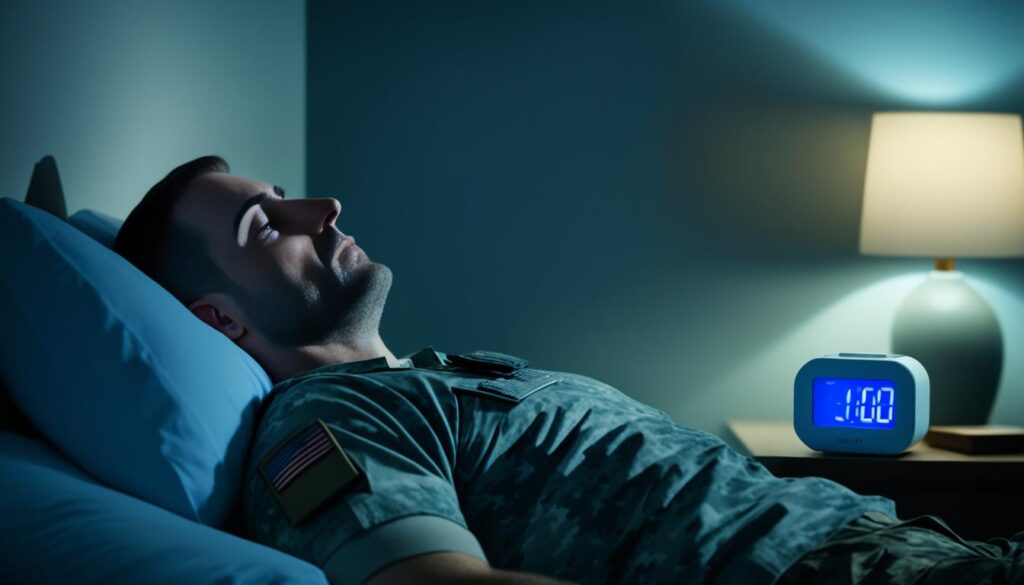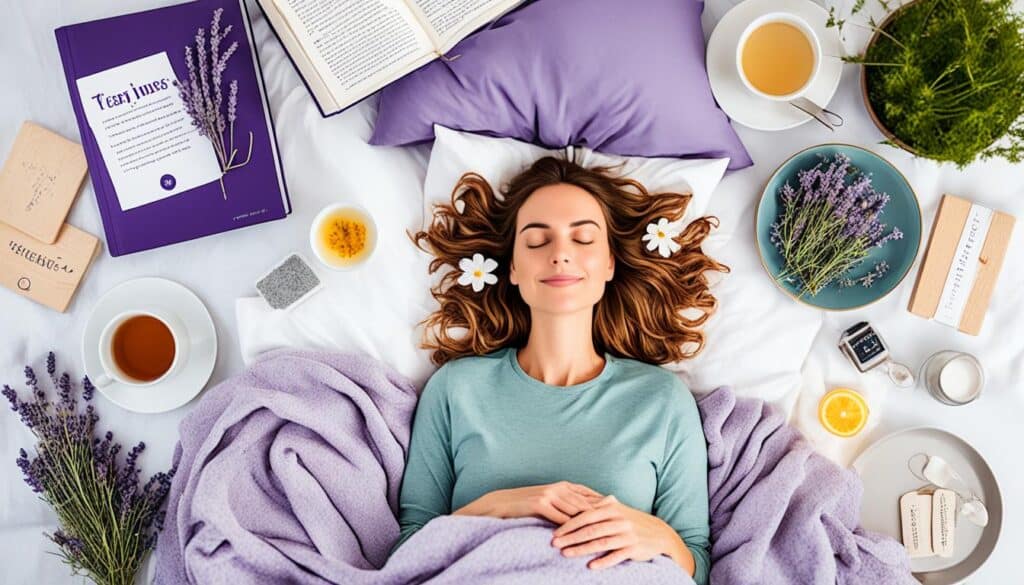Did you know it should take 10 to 20 minutes to fall asleep? If it’s less than 10 minutes, you might not be getting enough sleep. If it takes longer, you might have insomnia. With 50 to 70 million Americans struggling with sleep issues, finding quick ways to sleep is key.
This guide will show you the best ways to sleep well. You’ll learn how to sleep fast and wake up feeling refreshed. Say goodbye to sleepless nights and hello to a day full of energy.
Key Takeaways
- A healthy sleep latency period ranges from 10 to 20 minutes.
- Relaxation techniques like meditation and breathing exercises can shorten the time it takes to fall asleep.
- Maintaining a consistent sleep schedule is essential for good sleep hygiene.
- Setting up a sleep-friendly environment can significantly enhance sleep quality.
- Utilizing the military method can help you fall asleep within minutes, even in less-than-ideal conditions.
Table of Contents
The Importance of a Sleep Routine
Having a steady sleep routine is key for your health and happiness. It helps your body get into a rhythm, making it easier to fall asleep and wake up feeling fresh. It tells your brain when it’s time to sleep and when to be awake.
Setting a Consistent Sleep Schedule
It’s vital to stick to a sleep schedule for quality sleep. Going to bed and waking up at the same time every day trains your brain to feel sleepy at night. This helps you get the seven hours of sleep you need each night, which is good for adults.
Starting this habit can be hard if you’re used to sleeping at different times. But, the benefits are huge, like better focus and lower risk of serious health issues like heart disease and depression.
Preparing for Bedtime
Getting ready for bed is important to tell your body it’s time to relax. A bedtime routine includes activities done 30 to 60 minutes before sleep. These can be things like deep breathing, muscle relaxation, or reading a simple book under a soft lamp.
Other good things to do before bed include writing in a journal, making a to-do list, dimming the lights, and turning off screens an hour before sleep. Listening to calming music or white noise can also improve your sleep.
Adding these steps to your bedtime routine gets your mind and body ready for sleep. It sets you up for a night of deep and refreshing rest.
Creating a Sleep-Friendly Environment
Creating a sleep-friendly environment is key to getting a good night’s rest. Focus on room temperature and aromatherapy to make your space calm and relaxing. This can help you sleep better.
Optimizing Room Temperature
Keeping the room at the right temperature can help you fall asleep faster and stay asleep. The ideal temperature is between 60°F and 67°F. A temperature of 65°F is often best.
This temperature helps your body cool down naturally while you sleep. This cooling process is important for good sleep. So, make sure your room is at this ideal temperature to sleep better.
| Temperature (°F) | Impact on Sleep |
|---|---|
| 60-67°F | Optimal; supports thermoregulation and deep sleep |
| Below 60°F | Too cold; may lead to discomfort and sleep disturbances |
| Above 67°F | Too warm; can cause frequent awakenings and poor sleep quality |
Using Aromatherapy
Adding aromatherapy to your bedtime routine can also improve your sleep. Essential oils like lavender help you relax and reduce anxiety. Peppermint and heliotropin also make the atmosphere calming.
Put a few drops of essential oil in a diffuser or your bath before bed. This can help you relax and prepare for sleep.
Keep your bedding clean to avoid dust mites and allergens. Regular cleaning and noise-blocking curtains can make your bedroom quiet and peaceful. This can greatly improve your sleep quality.
Meditation and Mindfulness Practices
Practicing meditation and mindfulness can make your sleep much better. These methods help reduce stress and make you feel relaxed. This is key for getting good sleep.
Benefits of Mindfulness Meditation
Mindfulness meditation helps you focus on now. It lowers anxiety and makes it easier to fall asleep. Studies show it works as well as other treatments for insomnia.
Guided meditation can really improve your sleep. It reduces stress in the brain and lowers stress hormones. This helps you sleep better.
- Improves sleep quality: Studies say mindfulness meditation can make sleep better, like exercise or therapy.
- Reduces stress: Meditation helps lower anxiety, which often stops people from sleeping well.
- Increases relaxation: Regular practice makes your mind peaceful. This helps you easily move from being awake to sleeping.
Practicing Yoga for Better Sleep
Adding yoga to your routine can greatly improve your sleep. Research shows yoga can lessen stress, make sleep better, and help with insomnia from health issues. Yoga Nidra, a special type of yoga, can even cut down time spent awake at night.
- Reduces physical tension: Yoga helps release physical tension that can stop you from sleeping.
- Enhances mental calmness: Yoga makes you mentally calm, which is important for good sleep.
- Facilitates better sleep efficiency: Doing yoga regularly can make your sleep more efficient and restful.
| Studies and Findings | Details |
|---|---|
| Insomnia Prevalence | About 35% to 50% of adults have trouble sleeping. |
| Mindfulness Meditation Success | A 2018 study looked at 18 trials and found mindfulness meditation improves sleep quality. |
| Yoga Benefits | Studies confirm yoga helps with stress, sleep, and managing insomnia. |
Using mindfulness meditation and yoga together can help you sleep better and feel better overall. Remember, sticking with these practices is important to see the best results.
Utilizing Relaxation Techniques
Learning sleep relaxation methods can change the game for those who struggle with sleep. In the U.S., about 1 in 3 people don’t get enough sleep. Many can get better sleep with the right relaxation techniques.
Proven techniques for better sleep include progressive muscle relaxation and guided imagery. These methods help reduce stress and tension. They make your mind and body relax more deeply:
- Progressive Muscle Relaxation: This method involves tensing and then relaxing different muscle groups. It helps with physical relaxation. By focusing on tensing and releasing muscles, you can reduce stress and feel calmer.
- Guided Imagery: Visualization exercises like body scans can distract your mind from worries. A 2002 study showed that “imagery distraction” helped people fall asleep faster. Those with general distractions or no instructions took longer to fall asleep.
- Acupressure: Pressing certain points like the Spirit gate, Inner frontier gate, and Wind pool can help you sleep faster. A 2019 study found that acupressure slightly reduced sleep time and improved sleep quality.
It’s important to try different sleep relaxation methods to see what works for you. Regular practice is key for long-term benefits. Some conditions or medications might affect how well these techniques work.
Talk to your healthcare provider before trying new relaxation methods, especially if you have a medical condition. Adding these techniques to your bedtime routine can greatly improve your sleep and overall health.
Effective Breathing Exercises
Learning effective breathing exercises for sleep can change how well you sleep. Focusing on your breath can help calm your mind and relax your body. We’ll look at two key techniques: the 4-7-8 breathing method and progressive muscle relaxation.
The 4-7-8 Breathing Method
The 4-7-8 technique for sleep helps you relax. Here’s how to do it:
- Inhale softly through your nose for 4 seconds.
- Hold your breath for 7 seconds.
- Exhale completely through your mouth for 8 seconds.
Do this cycle 4-8 times for best results. Studies say doing this twice a day is most effective. It lowers anxiety and slows your heart rate, getting your body ready for sleep.
Progressive Muscle Relaxation
Progressive muscle relaxation for sleep means tensing and then relaxing different muscle groups. It helps reduce stress and tension, making it easier to sleep. Here’s how to do it:
- Find a quiet place and lie down comfortably.
- Start with your toes, tense each muscle group for 5 seconds.
- Slowly release the tension while feeling the relaxation spread.
| Technique | Steps | Recommended Repetitions |
|---|---|---|
| 4-7-8 Breathing Method | Inhale (4s) – Hold (7s) – Exhale (8s) | 4-8 cycles, twice daily |
| Progressive Muscle Relaxation | Tense muscles – Hold (5s) – Release | Until complete body relaxation |
Adding these breathing exercises to your bedtime routine can make falling asleep easier. It can also improve your sleep quality and overall health.
The Military Method for Rapid Sleep
The military sleep method helps people fall asleep fast, even in tough situations. It uses physical relaxation and mental pictures to make falling asleep quick. This method is used by the military because it works well.

Step-By-Step Guide
This guide will walk you through the steps of the military sleep method. It’s a way to sleep fast and well. Here’s how to do it:
- Relax Your Face: Begin by relaxing your face muscles, like your tongue, jaw, and eyes.
- Lower Your Shoulders: Let your shoulders drop, then your arms, one side at a time.
- Breathe Out and Relax: Breathe out to release tension in your chest. Then, relax your legs, starting from the thighs down. Deep breathing helps you fall asleep quicker.
- Clear Your Mind: Try to clear your mind for 10 seconds before imagining a calm scene. This helps reduce stress and makes falling asleep easier.
Benefits and Efficiency
The military sleep method is very efficient, even in tough places. Here are some key benefits:
- Rapid Sleep Onset: With regular practice, you can fall asleep in under two minutes.
- Promotes Relaxation: Deep breathing and muscle relaxation calm your nervous system. This can help with insomnia.
- Improves Mental Health: Visualization and deep breathing can reduce anxiety and boost your mood.
About one-third of Americans have trouble sleeping. Using the military sleep method can make a big difference. It’s important to practice regularly to get the most out of it.
Enhancing Sleep Hygiene
Improving sleep hygiene practices is key to getting consistent and restful sleep. Important habits include sticking to a regular sleep schedule, cutting down on blue light, and watching your caffeine intake. This helps improve sleep quality. Try to go to bed and wake up at the same time every day to help your body’s natural sleep cycle.
Starting a calming bedtime routine 30–60 minutes before sleep can help you fall asleep faster. Good activities include taking a warm bath, doing gentle stretches or yoga, and meditating. Stay away from electronic devices because they give off blue light, which can lower melatonin levels and make it tough to sleep.
Regular exercise, like at least 30 minutes of aerobic activity daily, can also make your sleep better. Working out outside can help by getting you natural light, which helps with your sleep cycle. But, try not to exercise too close to bedtime to avoid messing with your sleep.
Watch how much caffeine you drink. It can affect you for 3–7 hours, so drink it earlier in the day and know how much you can handle. Also, make your bedroom comfy with the right temperature, good bedding, and little light and noise to help your sleep.
Use your bed only for sleeping and sex to make it a sleep-only place in your mind. If you can’t sleep in 20 minutes, get up and do something relaxing to avoid getting stressed. Don’t nap too much, especially in the late afternoon, to keep your nighttime sleep right.
Dealing with stress before bed through journaling, meditating, and getting your tasks in order can help calm you down and improve your sleep. Also, eating big meals, drinking alcohol, and smoking before bed can cause acid reflux and disrupt your sleep. Try to get some natural light during the day, use warm light bulbs, and set devices to night mode at night.
- Maintaining a consistent sleep schedule
- Engaging in relaxing bedtime routines
- Limiting caffeine intake
- Creating a sleep-conducive environment
- Managing light exposure
Listening to Soothing Music
Adding soothing sounds to your bedtime routine can make you sleep better. Music before bed helps you fall asleep faster and sleep more soundly. This means you get to rest more while in bed.
A study found adults who listened to 45 minutes of sleep music before bed slept better from the first night. This music’s calming effects create a cozy atmosphere that lowers anxiety.
Music can trigger the release of dopamine, boosting good feelings at bedtime and potentially managing pain. This contributes to a relaxed state, allowing for smoother sleep onset.
- Relaxation: Music soothes the autonomic nervous system, leading to slower breathing, a lower heart rate, and reduced blood pressure.
- Noise Management: Music helps drown out disruptive nighttime noise, distracting you from troubling thoughts.
Studies have looked into different music genres for sleep but haven’t found a single best type. However, relaxing sleep music usually has soft melodies, steady rhythms, slow tempo, and minimal tone changes. Classical or new-age music are often chosen, but what works best is what you like.

- Select the right playlist composed of relaxing songs.
- Use a suitable device for playing music, ensuring it’s comfortably accessible.
- Keep the volume low to prevent disturbances.
- Avoid music with complex lyrics or strong beats that may hinder relaxation.
Make a habit of using soothing sounds for sleep. As you try different music, you might find it’s key to a good night’s sleep. It helps you smoothly move from being awake to sleeping well.
Diet and Sleep: What to Eat and Avoid
The food we eat greatly affects our sleep. It changes how fast we fall asleep and how well we rest. Knowing which foods help sleep and which ones to avoid can make a big difference in how well we sleep.
Foods That Promote Sleep
Some foods can make sleep better. For example, tart cherry juice is full of melatonin, a sleep hormone. Drinking tart cherry juice has been shown to increase sleep time and make sleep more efficient for people with insomnia.
Kiwi is also good for sleep. Eating two kiwis before bed helps people fall asleep faster and sleep better. Kiwi’s nutrients, like serotonin, help improve sleep.
Fatty fish like salmon and tuna are good for sleep too. They have vitamin D and omega-3 fatty acids that help keep serotonin levels stable, leading to better sleep. Studies have linked eating fatty fish to better sleep and daytime function.
Also, a moderate amount of protein with tryptophan and carbs can help sleep. Nuts are great for sleep because they have melatonin, omega-3’s, magnesium, and zinc. These nutrients improve sleep quality, as seen in a clinical trial with older adults.
Malted milk is another drink that might help you sleep better. It has B and D vitamins, phosphorus, zinc, and magnesium. Drinking malted milk before bed can reduce sleep interruptions.
Dietary Habits to Avoid Before Bedtime
There are also foods to avoid before bed. High-fat diets can hurt sleep. A study on rats found that high-fat diets caused poor sleep and excessive sleepiness during the day.
Spicy foods like red pepper can also disrupt sleep. They raise body temperature, which can stop the natural temperature drop needed for good sleep. It’s best to avoid spicy foods before bedtime.
Alcohol has a mixed effect on sleep. It can make you fall asleep faster and sleep deeper at first, but it can disrupt sleep later and make sleep apnea worse. It’s best to limit alcohol close to bedtime.
Lastly, be careful with caffeinated beverages, even if they’re decaf. Some decaf coffee has more than 13 milligrams of caffeine in a 16-ounce cup, which can make it hard to fall asleep.
By knowing how diet affects sleep and making smart food choices, you can improve your sleep quality.
Conclusion
When it comes to getting better sleep, a full approach is key. Start by setting regular sleep times to help your body clock. Before bed, try relaxing activities like taking a bath or reading to help you sleep faster.
Creating the right sleep space is also important. The National Sleep Foundation recommends a bedroom temperature of 60–67°F (16–19ºC) for good sleep. Use aromatherapy and choose a comfy mattress and bedding to improve your sleep. Avoid screens before bed as they can mess with your sleep patterns.
Try relaxation techniques like mindfulness meditation and the 4-7-8 breathing method to improve your sleep. These methods can help you relax and prepare for sleep. Also, watch what you eat before bed, avoiding caffeine and carbs, to help you sleep better. If you’re still having trouble sleeping, talk to a healthcare professional for personalized advice.
FAQ
What are some quick tips to fall asleep faster?
Quick tips to fall asleep include setting a sleep routine. Also, try relaxation techniques like deep breathing and meditation. Make sure your sleep environment is optimal and avoid electronics before bed.
How does setting a consistent sleep schedule help me sleep better?
Setting a consistent sleep schedule helps regulate your body’s internal clock. It makes falling asleep and waking up easier. Your body gets used to sleeping and waking at the same time every day.
What is the ideal room temperature for sleeping?
The ideal room temperature for sleeping is between 60°F and 67°F. This range keeps your body in balance, which is key for good sleep.
Can aromatherapy really enhance sleep quality?
Yes, aromatherapy can make sleep better. Essential oils like lavender and peppermint calm you down. They help reduce stress and make falling asleep easier.
How does mindfulness meditation improve sleep?
Mindfulness meditation helps you focus on now. It lowers anxiety and helps you relax before sleep. Regular practice makes sleep better by easing tension and calming your mind.
What are some effective breathing exercises to help me fall asleep?
Try the 4-7-8 breathing method for calmness. Breathe in for 4 seconds, hold for 7, and breathe out for 8. Or, do progressive muscle relaxation to ease stress before sleep.
How does the military method help people fall asleep quickly?
The military method uses muscle relaxation and mental imagery to sleep fast. It works even in tough conditions by relaxing your body and clearing your mind.
What are the benefits of using music to improve sleep?
Music before bed creates a cozy atmosphere and lowers anxiety. It also improves sleep quality. Soothing sounds or calming music are great for those with chronic sleep issues.
Which foods can help promote better sleep?
Foods high in tryptophan, magnesium, and melatonin like bananas, almonds, and chamomile tea help sleep. These nutrients support your sleep cycle and make you relax.
What dietary habits should I avoid before bedtime to ensure better sleep?
Avoid big meals, caffeine, and stimulants before bed as they disrupt sleep. Choose light snacks like bananas or almonds to help you sleep.
Source Links
- How to Fall Asleep Fast: 5 Tested Strategies
- 20 Simple Ways to Fall Asleep Fast
- How to Fall Asleep Fast: 7 Expert-Recommended Strategies
- Bedtime Routines for Adults
- 6 steps to better sleep
- How to Make a Sleep-Friendly Bedroom – National Sleep Foundation
- Bedroom Environment: What Elements Are Important?
- 18 Tips to Create the Ultimate Sleep Environment and Improve Your Quality of Sleep
- The Ultimate Guide to Mindfulness for Sleep
- Meditation for Sleep
- How to Use Meditation for Better Sleep
- How to Fall Asleep in 10, 60, or 120 Seconds
- Relaxation Exercises To Help Fall Asleep
- Breathing Techniques for Sleep
- The 8 Best Breathing Techniques for Sleep
- What Is the Military Sleep Method?
- Train yourself to fall asleep in 2 minutes with this viral sleep hack
- Try the Military Sleep Method to Fall Asleep in Mere Minutes (Naturally)
- 12 Tips for Better Sleep Hygiene
- Mastering Sleep Hygiene: Your Path to Quality Sleep
- 20 Tips for How to Sleep Better
- Music and Sleep
- Can Sleep Music Help You Fall Asleep?
- Better Sleep: 3 Simple Diet Tweaks
- The Best Foods To Help You Sleep
- 21 ways to fall asleep quickly and naturally
- 15 Proven Tips to Sleep Better at Night

Hello, I’m Dr. Asher Quinn, a sleep expert dedicated to the transformative power of restorative rest. In today’s fast-paced world, sleep is one of our most sacrificed needs, but I’m here to show you how quality sleep can massively enhance your productivity and well-being. After years of research and practical solutions, I help people take back control of their nights and maximize their days. Want to wake up refreshed and energized? Let’s dive into the science of better sleep!

